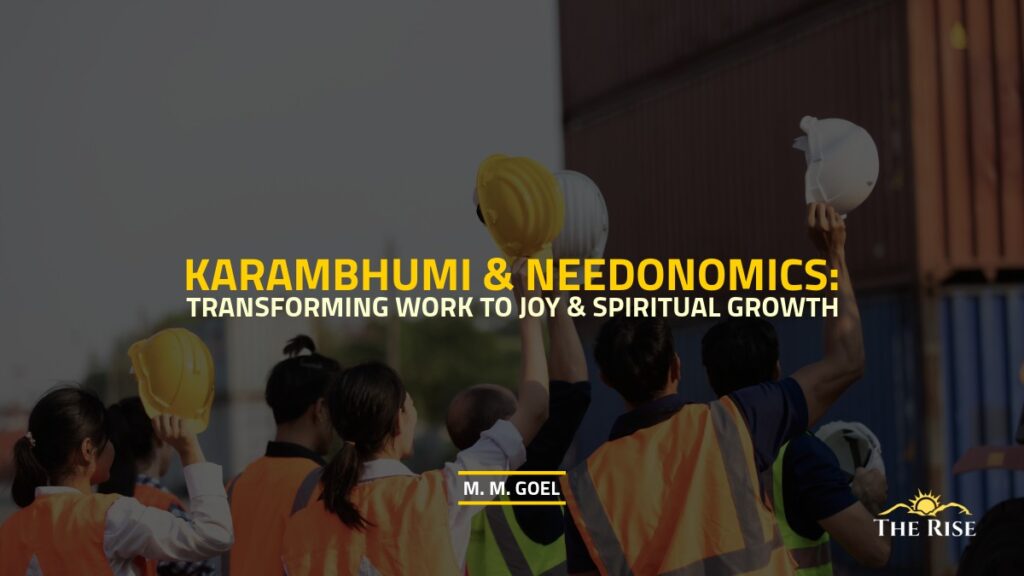In today’s context, the idea of Karambhumi assumes renewed importance. Globalization, migration, and digitization have blurred the boundaries of geographical workplaces. For the Needonomics School of Thought workplace—whether rural or urban, physical or digital—is a Karambhumi where ethical action can be cultivated.
Needonomics School of Thought (NST) emphasizes that Karambhumi—the land of action, or one’s workplace—is the most significant dimension of human existence. Work is not merely a necessity but a spiritual, ethical, and economic mandate. As affirmed in the Bhagavad Gita (3.5), no one can live for a single moment without performing work (karma). Thus, engaging in meaningful action becomes the easiest way to achieve perfection (siddhi) and fulfillment in life.
Universality of Work
Human existence is inseparable from action. Every breath, every thought, and every movement constitutes karma. Even when one claims to be “inactive,” the processes of living—breathing, thinking, feeling—are acts of engagement with life. In this sense, inaction is itself an illusion, for nature ensures continuous activity within and around us.
NST draws inspiration from this truth to argue that work is not a burden but a natural state of being. Rather than perceiving work merely as a means of livelihood, Needonomics invites us to see it as a pathway to self-actualization. Karambhumi is therefore not limited to offices, factories, or fields—it extends to every space where human energy is directed towards constructive outcomes.
Karambhumi in the Indian Ethos
In Indian thought, Bhumi symbolizes the sacred space that nurtures action, and karma signifies the responsibility of performing one’s duty. Together, Karambhumi reflects the holistic union of place, purpose, and performance. The Gita, at the heart of Krishna’s teaching, emphasizes that one must perform one’s duties without attachment to results, for work is inseparable from life and indispensable for spiritual growth (Bhagavad Gita 3.5).
Also Read: Reimagining the Global Economy: Empowering Vision of Needonomics
In today’s context, the idea of Karambhumi assumes renewed importance. Globalization, migration, and digitization have blurred the boundaries of geographical workplaces, but the centrality of work in shaping identity, dignity, and progress remains unchanged. For NST, every workplace—whether rural or urban, physical or digital—is a Karambhumi where ethical action can be cultivated.
Needonomics Perspective on Work
The Needonomics School of Thought critiques the modern obsession with Greedonomics—the pursuit of insatiable wants that fuels exploitation, inequality, and environmental degradation. Instead, it advocates Needonomics, where human behavior is guided by the satisfaction of real needs, moderation, and ethical responsibility.
When applied to Karambhumi, this perspective calls for the following:
- Purpose Driven Work: Work must serve genuine needs—individual, societal, and environmental—rather than being dictated by consumerism and artificial desires.
- Ethics in Action: The manner of performing work is as important as the output. Fairness, honesty, and respect for all stakeholders transform workplaces into spaces of trust and collaboration.
- Sustainability of Efforts: Karambhumi must be sustained for future generations. Economic development must not come at the cost of ecological and social collapse.
- Inner Fulfillment: True wealth lies not in accumulation but in finding joy and peace through duty performed with integrity and detachment from excessive materialism.
Work as Worship: Bridging Material and Spiritual Life
NST aligns with the timeless Indian teaching that “Work is Worship.” In performing one’s duty sincerely, one pays homage to the divine order of life. The dignity of labour is thus sacred, irrespective of the nature of work.
The tragedy of modern economic systems lies in the commodification of work, where labour is treated as a factor of production rather than an expression of human potential. This mindset alienates workers from their contributions and erodes the meaning of Karambhumi. Needonomics restores dignity to work by reasserting its role as both a spiritual discipline and a societal necessity.
Karambhumi and Road to Viksit Bharat 2047
India’s aspiration for Viksit Bharat by 2047 cannot be achieved without recognizing the sanctity of Karambhumi. Workplaces across the nation—factories, farms, schools, research labs, hospitals, and digital hubs—must become arenas of ethical productivity and innovation.
NST suggests that policymakers, entrepreneurs, and workers alike must align their actions with the principles of need-based economics. This includes prioritizing:
- Employment generation over automation-led joblessness.
- Skills development aligned with the needs of society rather than market hype.
- Inclusive growth that ensures every citizen finds a dignified role in Karambhumi.
- Encouragement of social entrepreneurship and cooperative models that reflect collective responsibility.
By making workplaces centers of needo-ethics rather than greed-driven pursuits, India can ensure not just material progress but holistic well-being.
Personal Dimension of Karambhumi
On an individual level, Karambhumi is where one’s values are tested and manifested. Every workplace demands choices—between honesty and dishonesty, service and selfishness, need and greed. The NST approach teaches individuals to consistently choose the “needo-best” in conduct and speech, ensuring harmony within and without.
Work also becomes a platform for self-discipline. Punctuality, sincerity, accountability, and humility are not just professional virtues but spiritual practices. When one views the workplace as sacred Karambhumi, every action, however small, contributes to personal evolution and collective good.
Conclusion
Work is not optional; it is the essence of living. The Bhagavad Gita reminds us that no one can escape action, even for a moment. What remains within our control is the spirit in which we act.
NST redefines Karambhumi as the ground of responsibility where needs are prioritized over wants, where ethics guide productivity, and where inner growth accompanies external achievement. By aligning workplaces with the principles of Needonomics, humanity can transform work from a source of stress into a source of joy, purpose, and perfection.
In this light, Karambhumi is not just a land of action but also the most reliable pathway to siddhi—perfection in life— achieved through the simplest and most accessible means: sincere, need-based work.
Disclaimer: The views expressed in this article are those of the author solely. TheRise.co.in neither endorses nor is responsible for them. Reproducing this content without permission is prohibited.

